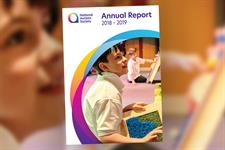The National Autistic Society increased its income from £96.1m to £99.8m in the year ending 31 March 2019, according to its latest annual report and accounts.
The document, which was posted on the Companies House website this week, reveals that the increase was largely due to £9.2m of capital funding from the Department for Education’s free schools programme.
This enabled the charity to build the Vanguard School in the London borough of Lambeth, a specialist secondary school that is due to open in January.
It will be the society’s third autism-specific school funded by the DfE programme.
The charity’s expenditure increased from £95.7m to £97.1m, which means the society generated a surplus of £2.7m, compared with £0.5m the previous year.
The report says: “The charity continues to face challenges, primarily across our contracted services along with continuing increases in staff costs to ensure that we can recruit and retain sufficient and capable staff.
“We continue to negotiate for uplifts with our funding authorities to reflect our increasing costs.”
The extra spending was partly due to the charity beginning the first phase of a digital transformation programme.
Carol Homden, chair of the charity, says in the report that the programme “will allow us to monitor the quality of our social care and education and children’s services even more effectively”.
Kelly Evans, director of finance at the society, told Third Sector that spending had also risen because the charity had implemented the National Living Wage for staff, which would cost £1.5m a year.
“We are fully compliant on this, including for sleep-in payments,” said Evans.
The society, which is a membership organisation, has 23,100 members, 116 UK branches and three active subsidiary companies.
The highest-paid member of staff was in the £140,001 to £150,000 pay bracket, which is the same as last year.
Caroline Stevens replaced Mark Lever as chief executive after he announced his resignation in February.
During the year, the charity paid out £115,000 in redundancy and £168,000 in ex-gratia agreements to staff.
The 10-strong senior management team received employment benefits of £737,000, down from £907,000 the previous year.
The report reveals that the charity set up a new independent safeguarding committee and commissioned YouGov to quiz 601 businesses on attitudes towards autism.
